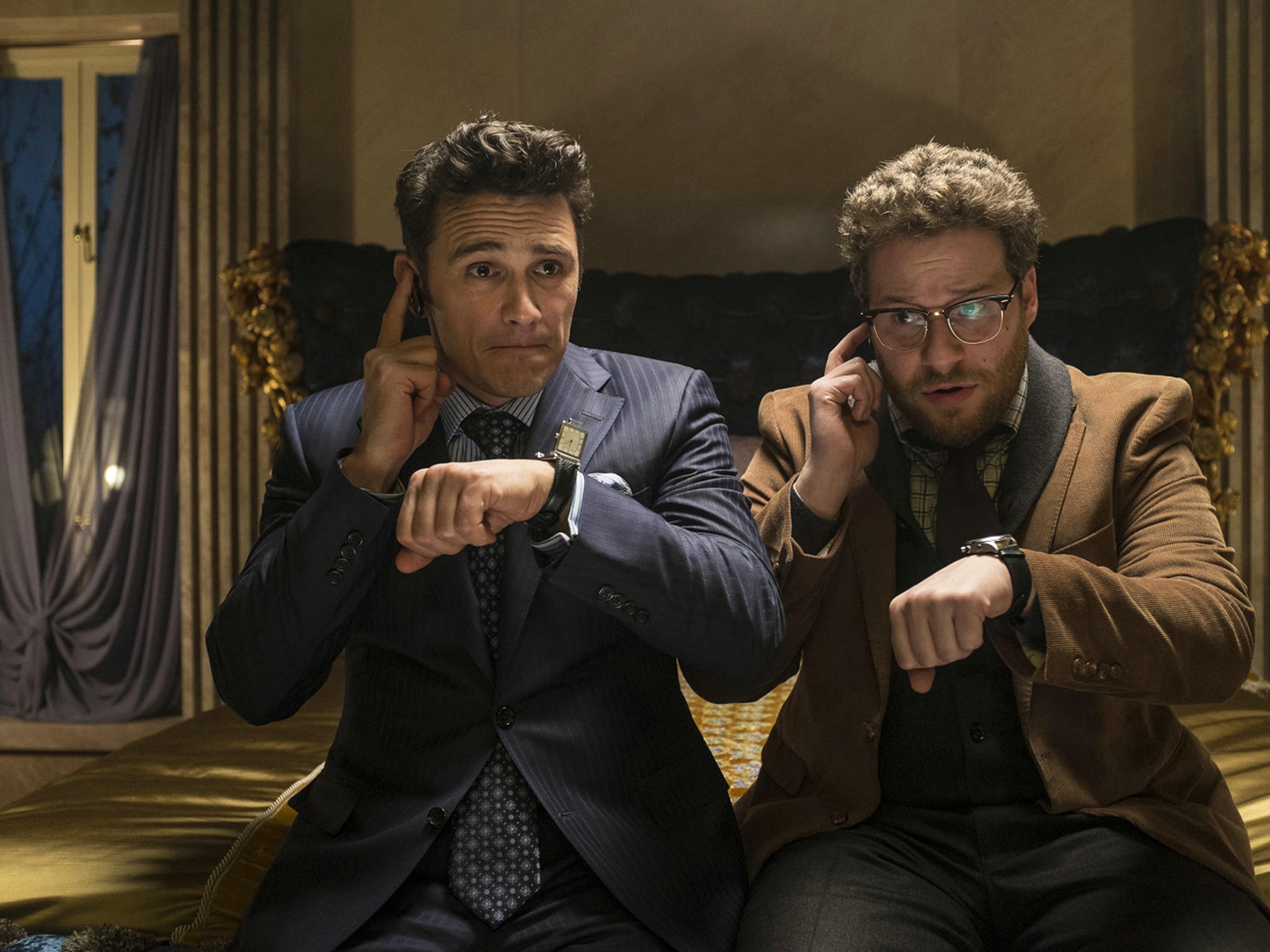The Interview: Hollywood figures outraged as Sony cancels film following North Korea’s threat
‘Brazen effort to suppress the distribution of movie’ achieves its goal

When Seth Rogen set out to co-direct and star in The Interview, a satirical slapstick about two hapless US TV journalists enlisted by the CIA to assassinate the leader of North Korea, he probably knew the film’s premise might generate some controversy – and with it, perhaps, some free publicity.
What Mr Rogen could not have known, however, was that his film would bring a studio to its knees, send ripples of fear through Hollywood, precipitate a new diplomatic crisis between the US and North Korea, and become a free-speech cause célèbre. US intelligence officials have now concluded that North Korea was indeed behind the recent hack of Sony Pictures computers and the ensuing online dump of corporate data, including sensitive employee details and private emails between top executives and other Hollywood figures.
The cyber attack, made public on 24 November, is believed to have been a response to Sony’s pending release of The Interview, which depicts the death of North Korean leader Kim Jong-un.
Last night, the White House said the incident was being treated as a national security matter.
On Wednesday, the studio cancelled the film’s Christmas Day release, after several major cinema chains declined to screen The Interview following threats from Guardians of Peace (GOP), the hacker group responsible for the cyber-attack, now believed to be linked to the Kim regime. While most North Koreans live without computers, let alone the internet, the regime is thought to have cultivated its own cadre of elite hackers. Last year, Pyongyang was blamed for a major hack of South Korean banks and media outlets that had been critical of the North.
North Korea had warned in the summer that the release of The Interview represented “an act of war” that would lead to “merciless” retaliation. This week, the GOP advised cinemagoers to avoid seeing the film. Invoking the 9/11 attacks in a message posted online on Tuesday, the hackers wrote: “We will clearly show it to you at the very time and places The Interview be shown, including the premiere, how bitter fate those who seek fun in terror should be doomed to.”
The film had been expected to enjoy its east coast premiere at the Sunshine Cinema in New York on Thursday evening, but Landmark, the company that owns the Manhattan theatre, cancelled the event on Tuesday.
The five biggest cinema groups in North America each subsequently announced that they would no longer show The Interview. In a statement, the studio said, “we respect and understand our partners’ decision” and “completely share their paramount interest in the safety of employees and theatregoers”.
Sony said it was “the victim of an unprecedented criminal assault against our employees, our customers, and our business,” adding: “Those who attacked us stole our intellectual property, private emails, and sensitive and proprietary material, and sought to destroy our spirit and our morale – all apparently to thwart the release of a movie they did not like.
“We are deeply saddened at this brazen effort to suppress the distribution of a movie... We stand by our filmmakers and their right to free expression and are extremely disappointed by this outcome.”
In spite of the hackers’ lurid threats, the Department of Homeland Security has maintained that there is “no credible intelligence to indicate an active plot against movie theatres.”
In an interview with ABC News on Wednesday, President Barack Obama acknowledged that such a concerted cyber attack on a major firm in the US was “very serious,” but emphasised that the physical danger to cinemas and cinemagoers was very low. “For now, my recommendation would be that people go to the movies,” he said.
News of The Interview’s cancelled release was met with outrage by other Hollywood figures, who decried Sony’s decision as a capitulation to the hackers.
Screenwriter Aaron Sorkin, whose hotly anticipated biopic of Apple founder Steve Jobs was the subject of some of the leaked Sony emails, said in a statement: “Today the US succumbed to an unprecedented attack on our most cherished, bedrock principle of free speech by a group of North Korean terrorists who threatened to kill moviegoers in order to stop the release of a movie.”
With Sony suggesting it has “no further release plans” for The Interview, many have urged the studio to make the film available to stream or download. Even Republican former presidential candidate Mitt Romney weighed in on Twitter, suggesting Sony distribute the film free online
It was also quietly announced that another North Korea-set film had been scrapped by its production company, New Regency. Pyongyang, due to go into production in March 2015, would have been a darkly comic thriller about an American accused of spying in North Korea. The film was set to star Steve Carell, who tweeted that it was a “sad day for creative expression”.
Join our commenting forum
Join thought-provoking conversations, follow other Independent readers and see their replies
Comments
Bookmark popover
Removed from bookmarks